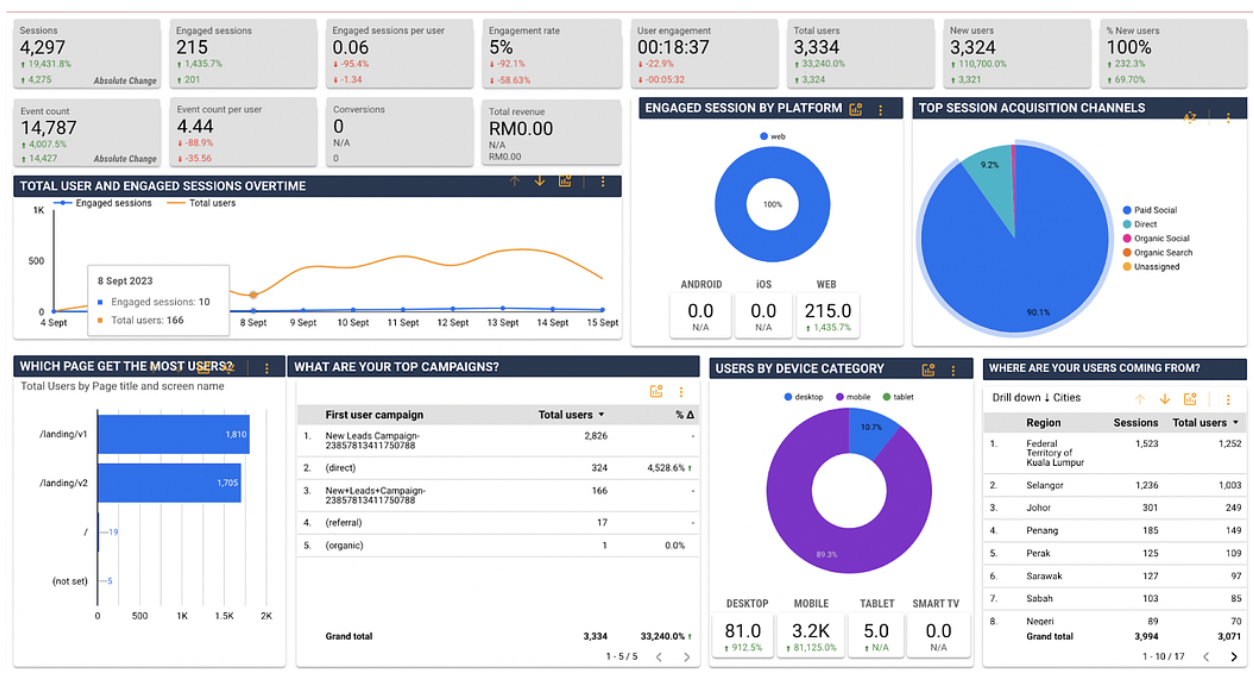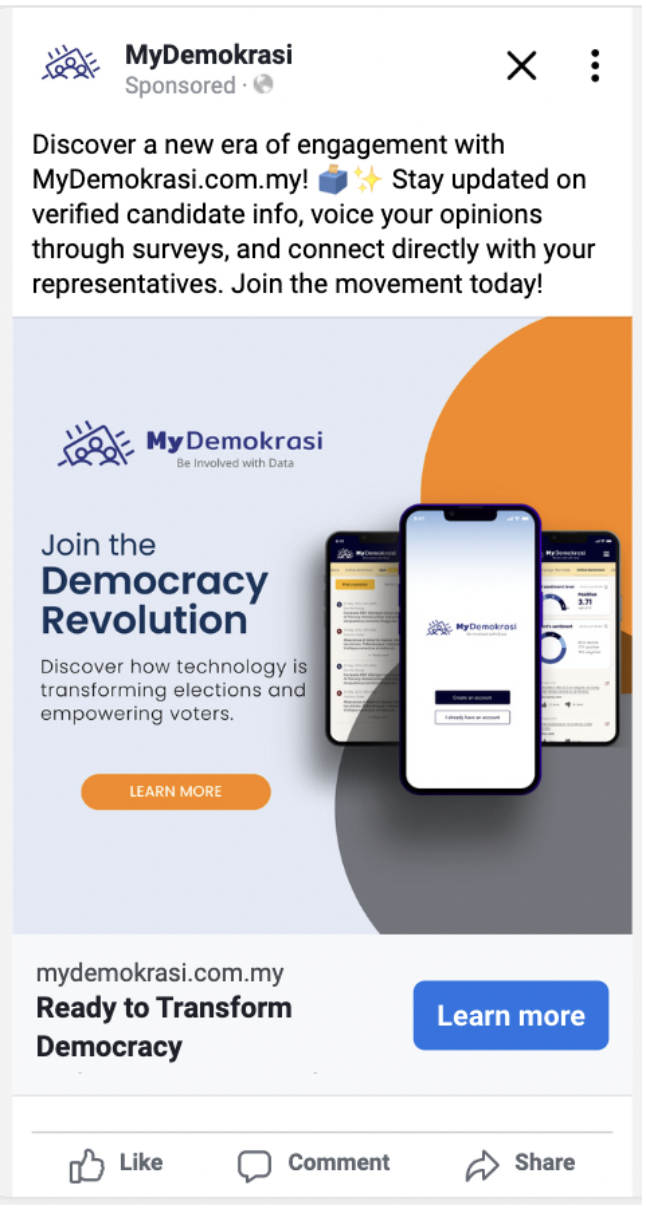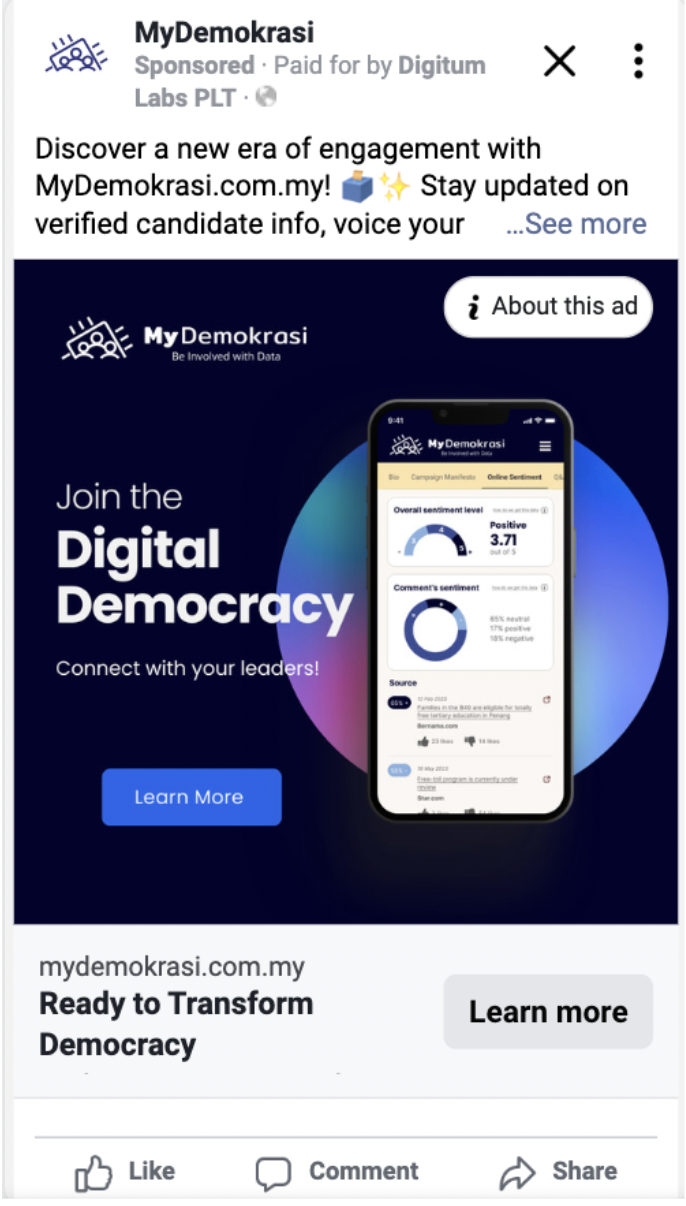Gauging voters and politicians interest in our idea
A blog by Sathish Rao, a Frontier Tech Hub Implementing Partner.
This post outlines learnings from the second sprint of our pilot, Pynx.
Quick recap from previous sprint
In our quest to digitalise the landscape of Malaysian democracy, the Digitum Labs team embarked on a journey of discovery. Our initial sprint was a voyage of enlightenment, where we unearthed valuable insights that have since served as the guiding stars of our project. We immersed ourselves in the perspectives of voters, deciphered the intricate dynamics of elections, honed our skills in crafting effective surveys, harnessed the power of mock-ups for clarity, and carefully selected parliamentary constituencies to be a part of this project. Read more in our sprint 1 blog. Armed with these newfound understandings, we set our sights on the horizon for Sprint 2.
Snapshot of Sprint 2: Gathering data and gauging public interest
Sprint 2 was a pivotal phase in our journey and our objectives were clear: to lay the groundwork for gathering accurate and reliable data from both politicians and voters, and to gauge the interest of the general public in our vision for an online political platform.
We set out to explore three overarching priorities.
1. Validating our surveys
Our first priority was to validate the surveys designed by the Digitum Labs team, in collaboration with local academic experts. We recognised that the reliability and validity of these surveys were of paramount importance as we aimed not only to create surveys that would resonate with Malaysian voters and politicians but also to ensure their wider acceptance and applicability. To achieve this, we sought the expertise of an external authority, a renowned political science professor from Universiti Putra Malaysia (UPM). His valuable insights and critical review helped us refine our surveys.
2. Connecting with politicians
The active participation of Malaysian politicians is crucial for our project’s success. To build this bridge, we set out on a comprehensive search mission to gather the contact details of ten prominent politicians. This meticulous process involved collecting personal mobile numbers, office numbers, email addresses, postal addresses, and the contact information of their personal assistants. Our approach was nothing short of professional and methodical. We initiated contact by sending official collaboration letters including comprehensive information packages about this pilot to their respective parliamentary offices. Subsequently, we followed up with emails, ensuring that we have reached both the politicians and their personal and special officers. The final touch was a courteous text message to their aides. We believe that this thorough protocol will prove instrumental in securing the commitment and enthusiasm of these politicians to join our project.
3. The MyDemokrasi landing page
To gauge public interest in our vision of an online political platform, we took a vital step forward by creating a landing page (https://mydemokrasi.com.my/). This digital gateway provides essential information about our project and encourages visitors who want to hear updates as the platform develops to leave their email addresses. It also featured a generic survey to gather insights into the public’s perceptions of our initiative. Questions such as, “What aspect of the project appeals to you the most?” and “What additional information would you like to learn about our project?” were posed. We also sought to identify potential concerns. Collaborating closely with FTL, our team unveiled the project’s name, ‘MyDemokrasi.’ This name carries profound significance, fusing the Malay word ‘Demokrasi’ (democracy) with ‘My,’ signifying ‘us’. Together, ‘MyDemokrasi’ encapsulates a sense of belonging to Malaysia and a commitment to embracing the digitalisation of Malaysian democracy.
Outcome of Sprint 2
1. Survey Validation: Ready to Roll
The external expert review of our survey emphasised the significance of using precise keywords and context in the surveys to maximise their effectiveness. Additionally, the expert advised shifting the survey scales from negative to positive to better capture respondents’ genuine responses. The result? Both surveys received validation with impressive scores of 88%. A validation score above 80 out of 100 indicates that both surveys have achieved content and face validity. This means that the surveys effectively measure the most relevant and important aspects related to our project's objectives and that they are understandable and relevant to the targeted population. This achievement signifies that we are well-prepared to proceed with actual data collection.
2. Politician Engagement: Challenges and Progress
Engaging with politicians proved to be a formidable task. While we established communication channels, obtaining their contact details proved to be time-consuming. This experience underscored the importance of effective time management to ensure the accuracy and reliability of contact information. Currently, we have received one response out of the ten politicians we initially targeted, and it's important to note that this response was exceptionally positive. The politician publicly announced their enthusiastic participation in our project, giving us confidence that even though it's taking longer than anticipated, we are on track to achieve our 80% confirmation rate target. The delay in obtaining responses was primarily due to the demanding schedules of these politicians, particularly their involvement in state elections across six states in August. To address this challenge, we are exploring the possibility of taking a more direct approach by personally visiting their parliamentary offices.
3. MyDemokrasi Web Launch: Building Trust and Engagement
Our MyDemokrasi web domain has been unveiled, and the initial response has been promising. We launched ad campaigns and gained insights into user preferences and engagement. We conducted A/B testing to understand the impact of different landing pages and ad campaigns.
Here's a summary of what we were testing and how we tested it:
Landing page versions: We created two different landing page versions: Landing Page Version 1 and Version 2. Version 1 focused on elaborated content, providing more information about our platform and its offerings, while Version 2, on the other hand, was product-driven, highlighting key product features.
Ad campaigns: We launched ad campaigns to drive traffic to our website and gain insights into user preferences and engagement. These ad campaigns had variations in ad copy, imagery, targeting, or other elements. For an example we are testing ad campaigns that are very people/business driven versus another set of ads which are product driven.
The main goal of our testing was to figure out which landing page worked better with our target audience. After running the A/B test, we saw that Landing Page Version 1 had a slightly higher engagement rate at 5.24%, while Landing Page Version 2 had a 4.82% engagement rate. This suggests that users may prefer the detailed content about who we are and what are motivations and objectives are, provided on Landing Page Version 1.
Based on these results, we think that trust might play a big role in getting leads and survey completions on our website. So, we plan to add testimonials from credible people who have given positive feedback. This can boost trust and credibility. We also want to review the content and messaging on our website to make sure it matches what our target audience wants. We noticed that using visuals to explain our project has been effective, so we'll include more visual elements to help users understand and engage with the detailed content.
Source: Data Analytics, MyDemokrasi, GA4
Facebook Ads
The crucial ‘So What?’
As we reflect on the outcomes of Sprint 2, a crucial question arises: “So what?” What do these insights mean for the next phase of our MyDemokrasi project? In conclusion, the outcomes of Sprint 2 serve as valuable guideposts for our journey towards Malaysian digital democracy. They remind us of the importance of validation, adaptability, and trust-building. The MyDemokrasi web launch has initiated a promising journey, and our commitment to enhancing the democratic landscape of Malaysia remains unwavering. In essence, our focus is on building trust through testimonials and addressing any content or privacy-related concerns that may be barrier to voters sharing their contact details. As we move forward, we will continue to refine our approach and learn from each experience, working towards a future of digital democracy that empowers all Malaysians. Stay tuned for further updates on our MyDemokrasi Frontier!
If you’d like to dig in further…
⛴️ Explore learnings from Pnyx’s first sprint





